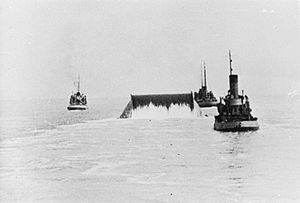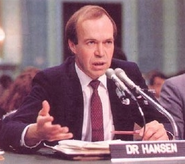Portal:Energy
| Main page | New articles & Tasks |
 The Energy Portal Welcome to Wikipedia's Energy portal, your gateway to energy. This portal is aimed at giving you access to all energy related topics in all of its forms.
|
Page contents: Selected article • Selected image • Selected biography • Did you know? • General images • Quotations • Related portals • Wikiprojects • Major topics • Categories • Help • Associated Wikimedia |
Introduction
Energy (from Ancient Greek ἐνέργεια (enérgeia) 'activity') is the quantitative property that is transferred to a body or to a physical system, recognizable in the performance of work and in the form of heat and light. Energy is a conserved quantity—the law of conservation of energy states that energy can be converted in form, but not created or destroyed. The unit of measurement for energy in the International System of Units (SI) is the joule (J).
Forms of energy include the kinetic energy of a moving object, the potential energy stored by an object (for instance due to its position in a field), the elastic energy stored in a solid object, chemical energy associated with chemical reactions, the radiant energy carried by electromagnetic radiation, the internal energy contained within a thermodynamic system, and rest energy associated with an object's rest mass. These are not mutually exclusive.
All living organisms constantly take in and release energy. The Earth's climate and ecosystems processes are driven primarily by radiant energy from the sun. The energy industry provides the energy required for human civilization to function, which it obtains from energy resources such as fossil fuels, nuclear fuel, and renewable energy. (Full article...)
Selected article

Operation Pluto (Pipeline Under the Ocean or Pipeline Underwater Transportation of Oil, also written Operation PLUTO) was an operation by British engineers, oil companies and the British Armed Forces to build oil pipelines under the English Channel to support Operation Overlord, the Allied invasion of Normandy during the Second World War.
The British War Office estimated that petrol, oil, and lubricants would account for more than 60 per cent of the weight of supplies required by the expeditionary forces. Pipelines would reduce the need for coastal tankers, which could be hindered by bad weather, were subject to air attack, and needed to be offloaded into vulnerable storage tanks ashore. A new kind of pipeline was required that could be rapidly deployed. Two types were developed, named "Hais" and "Hamel" after their inventors. Two pipeline systems were laid, each connected by camouflaged pumping stations to the Avonmouth-Thames pipeline. (Full article...)
Selected image

Photo credit: United States Department of Energy
The fireball created as energy is released in a nuclear explosion.
Did you know?

- The Power of Community: How Cuba Survived Peak Oil is a documentary film which details Cuba's efforts to recover from the 1990s economic crisis known as the Special Period?
- The Geysers (pictured), north of San Francisco, California, is the largest geothermal power development in the world?
- The International Energy Agency was founded in 1974 by the Organisation for Economic Co-operation and Development (OECD) in the wake of the 1973 oil crisis?
- Indian Railways has started to use Jatropha oil, blended with diesel fuel in various ratios, to power its Diesel locomotives?
- The South Wales Gas Pipeline is the largest high pressure gas pipeline in the United Kingdom?
- The Presbyterian Church (USA) was the first major religious denomination in the world to call on its followers to become carbon neutral?
- There was partial meltdown at the Three Mile Island nuclear power plant in 1979?
- A hybrid electric vehicle achieves better fuel economy than a conventional vehicle without being hampered by the limited range of an electric vehicle?
Selected biography
Hansen studied at the University of Iowa, obtaining a B.A. in Physics and Mathematics, an M.S. in Astronomy and a Ph.D. in Physics. He was elected to the National Academy of Sciences in 1996 and received the Heinz Environment Award for his research on global warming in 2001.
Hansen is a vocal critic of the Bush Administration's ideology on climate change. In 2005 and 2006, he claimed that NASA administrators have tried to influence his public statements about the causes of climate change. He has also claimed that the White House edited climate-related press releases from federal agencies to make global warming seem less threatening, and that he is unable to speak 'freely', without the backlash of other government officials.
Hansen has said that a global tipping point will be reached by 2016 if levels of greenhouse gases are not reduced. After this point global warming becomes unstoppable. As a result he claims that there may be a rise in sea levels by as much as 10 feet (3 metres) by 2100.
In the news
- 13 December 2024 – Russian invasion of Ukraine
- Russia launches one of its largest attacks on the Ukrainian energy infrastructure since the conflict began, with about 290 missiles fired and drones striking multiple regions. The Russian Defense Ministry claims that the attack was in response to a recent Ukrainian ATACMS attack on Taganrog-Central air base in Rostov Oblast, Russia. (The Kyiv Independent) (UNN)
- 4 December 2024 – 2024 Cuba blackouts
- Another round of blackouts in Cuba leave millions of households without power. The energy ministry says that it is prioritizing restoring electricity to hospitals and water pumping facilities. (Reuters)
- 30 November 2024 – Ibar-Lepenac attack
- Police arrest eight people linked to an explosion on a canal near Zubin Potok, Mitrovica District, Kosovo, that supplies water to the country's two main power plants. The Kosovar government blames Serbia for the "terrorist" acts, which Serbia denies. (Al Jazeera) (Euronews) (Le Monde)
- 28 November 2024 – Russian invasion of Ukraine
- Russian strikes against Ukrainian infrastructure, Ukrainian energy crisis
- 22 November 2024 –
- Energy company Phillips 66 is indicted in a United States federal court on six charges of violating the Clean Water Act in Los Angeles County, California. (CBS News)
General images
Quotations
- "Without radical international measures to reduce carbon emissions within the next 10 to 15 years, there is compelling evidence to suggest we might lose the chance to control temperature rises. Failure to act will make an increase of between 2 and 5 degrees [3.6 - 9°F] in average temperatures almost inevitable." – Tony Blair, 2006
- "The question is not whether climate change is happening or not, but whether, in the face of this emergency, we ourselves can change fast enough." – Kofi Annan, 2006
- "I promise you a day will come when our children and grandchildren will look back and they will ask one of two questions. Either they will ask, 'What in God's name were they doing? Didn't they see the evidence?' Or, they may look back and say 'How did they find the uncommon moral courage to rise above politics and redeem the promise of American democracy?'" – Al Gore, 2007, on global warming.
Related portals
WikiProjects
WikiProjects connected with energy:
Other WikiProjects that may be of interest:
Major topics
Major categories
National energy supply, use & conservation
National electricity sector
Politics, economics, environment
- Climate change
- Energy conservation
- Energy economics
- Energy crises
- Energy development
- Energy policy
- Peak oil
Energy sources
- Fuels
- Biofuels
- Fossil fuels
- Fusion power
- Nuclear technology
- Renewable energy
- Energy conversion
- Electric power
- Energy storage
Energy-related design
Scientific usage
Help

Puzzled by energy?
Can't answer your question?
Don't understand the answer?
- Ask at the reference desk
- Read the Wikipedia help pages
For further ideas, to leave a comment, or to learn how you can help improve and update this portal, see the talk page.
Associated Wikimedia
The following Wikimedia Foundation sister projects provide more on this subject:
-
Commons
Free media repository -
Wikibooks
Free textbooks and manuals -
Wikidata
Free knowledge base -
Wikinews
Free-content news -
Wikiquote
Collection of quotations -
Wikisource
Free-content library -
Wikiversity
Free learning tools -
Wiktionary
Dictionary and thesaurus

























































































































































































